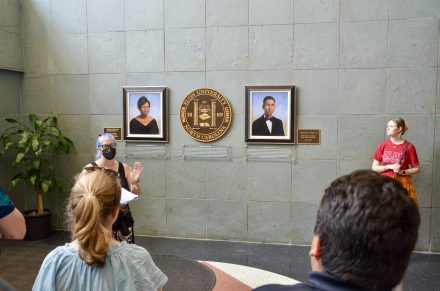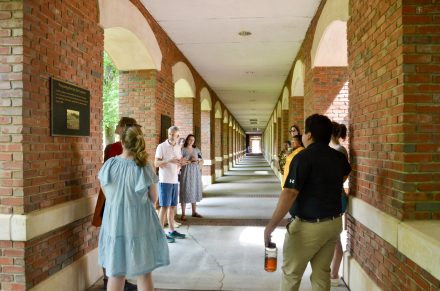With the theme of “Reconciling with our Present by Exploring our Past,” the monthlong series is drawing upon the work of the Committee on Elon History and Memory.
The annual Race, Reflection and Discussion Series focusing on Black achievement and anti-Black racism in Elon’s history continues as the community prepares to commemorate Juneteenth. The Center for Race, Ethnicity and Diversity Education offers this personal and professional development opportunity in partnership with the Division of Inclusive Excellence, Education and Development, Committee on Elon History and Memory and the Office of Leadership and Professional Development.
This year’s theme, “Reconciling with our Present by Exploring our Past,” connects to past years when the series has focused on social justice and fighting systemic racism. The inaugural series was in 2015 after the fatal shootings of nine Black people by a white man at Emanuel African Methodist Episcopal Church in Charleston, South Carolina.
This year’s theme also aligns with the principles of Juneteenth, a holiday commemorating the moment enslaved African Americans were finally freed, 157 years ago. On June 19, 1865, federal officers arrived in Galveston, Texas, to announce the end of slavery. This year marks the first anniversary of Juneteenth as a federal holiday, which is observed as a time for celebration as well as reflection.
On Juneteenth, “we pause together to reflect on racism’s widespread impact, and to strengthen our commitment to equity for Black Americans, so that we all may be free,” said Randy Williams, vice president and associate provost for inclusive excellence.
In the first two weekly sessions, members of the Committee on Elon History and Memory led discussions on anti-Black racism, and a campus tour exploring the physical environment from a diversity, equity and inclusion framework.
“The topics this year are allowing us to discuss an inclusive interpretation of Elon’s history with validations of historical truths that include voices and lived experiences of those with marginalized identities,” said Sylvia Muñoz, assistant dean of students and director of the CREDE.

The June 8 session featured the “Teaching about Anti-Black Racism from Elon’s History” website co-created by Charles Irons, William J. Story Sr. Professor and professor of history, and Damion Blake, assistant professor of political science and policy studies and Faculty Fellow for Race, Ethnicity and Diversity.
“As long as we continue to live in a society characterized by racial injustice, we need to continue conversations about race and specifically Black Americans,” Irons said. “It’s unclear to me how we would ever hope to achieve a more just society without either diagnosing the causes of inequality or confronting white supremacy.”
The June 15 session featured a campus tour facilitated by Evan Gatti, associate professor of art history, Chrystal Carpenter, coordinator of university archives and special collections and associate librarian, and Irons. The tour guided participants through campus and discussed ideas about naming, structures, furniture and commemorative plaques and statues.
All three facilitators are members of the Committee on Elon History and Memory. Gatti currently serves as chair, and Irons served as chair from 2018 until 2020.

The remaining two sessions in the series will be held at 11:30 a.m. on June 22 (“Reflecting on our Past to Dialogue about Present Racial Inequities”), and June 29 (“Racial Reconciliation and Healing: A Dialogue about Action and Next Steps.”) The series is a part of the ongoing work to make Elon a university for all and is the culmination of several efforts to connect the past to the present to move into the future.
“At Elon, the framing ‘Inclusive Excellence’ calls for a community that strives to dismantle oppression,” said Carla Fullwood, director of the Office of Inclusive Excellence, Education and Development. “I think the Race, Reflection and Discussion Series creates a space to continue dialogue and raise consciousness about racial difference and various forms of racism to address type oppression.”
The series examines the Committee on Elon History and Memory’s Fall 2020 report that made recommendations for teaching and learning about the anti-Black racism in Elon’s history. Among the 13 recommendations included in the report, which align with the university’s ongoing diversity, equity and inclusion initiatives, are establishing a permanent version of the Committee on Elon History and Memory; implementing a new process for the renaming of spaces on campus; developing new commemorative practices around a more inclusive version of Elon’s history, such as oral history projects and tours about the Black experience at Elon; and creating multiple pathways for students to confront race in their coursework. The report also calls for support of The Black Lumen Project, a university effort evolving from Elon’s participation in Universities Studying Slavery. (Read more about the work of the Black Lumen Project so far and what lies ahead here.)


